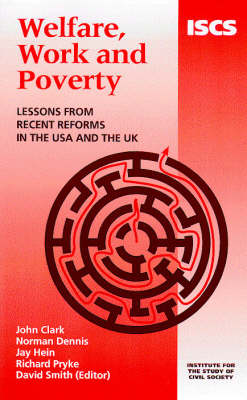Welfare reform has become one of the hottest political topics of recent years. Not only is the welfare state draining billions from the economy, it has given rise to an underclass, lacking the social capital necessary to participate in mainstream society. In this collection of essays the authors consider attempts to reform welfare in both the USA and the UK. David Smith is unimpressed by the Blair government's two flagship policies, the much vaunted New Deal and the introduction of the working families tax credit. Norman Dennis dissects the hollow rhetoric of the official line on the family, and exposes the anti-family tendencies of proponents of the 'Third Way'. Richard Pryke dismisses exaggerated poverty statistics and finds the real problem to be an underclass concentrated in social housing. It is left to US contributors John Clark and Jay Hein to provide an example of welfare reform that works. Since the 1996 welfare reform legislation, the USA has seen caseloads fall by nearly 40 per cent nationwide, with some states showing falls of over 80 per cent.
In Britain, on the other hand, half-hearted and piecemeal measures have failed to reform a system that saps incentive and rewards bad behaviour. It need not be like this, and it is not too late to change. "The reality is that the New Deal has done very little of what is claimed for it. Of the 191,000 people placed into jobs through the New Deal since its inception, more than 50,000 were back on benefits within three months...it is likely that the numbers ultimately returning to the dole are even greater...Of the rest, the vast majority would have found jobs anyway, thanks to the strength of the economy." The Sunday Times
- ISBN10 1903386004
- ISBN13 9781903386002
- Publish Date 25 April 2000
- Publish Status Out of Print
- Out of Print 3 May 2007
- Publish Country GB
- Imprint Civitas:Institute for the Study of Civil Society
- Format Paperback
- Pages 104
- Language English
